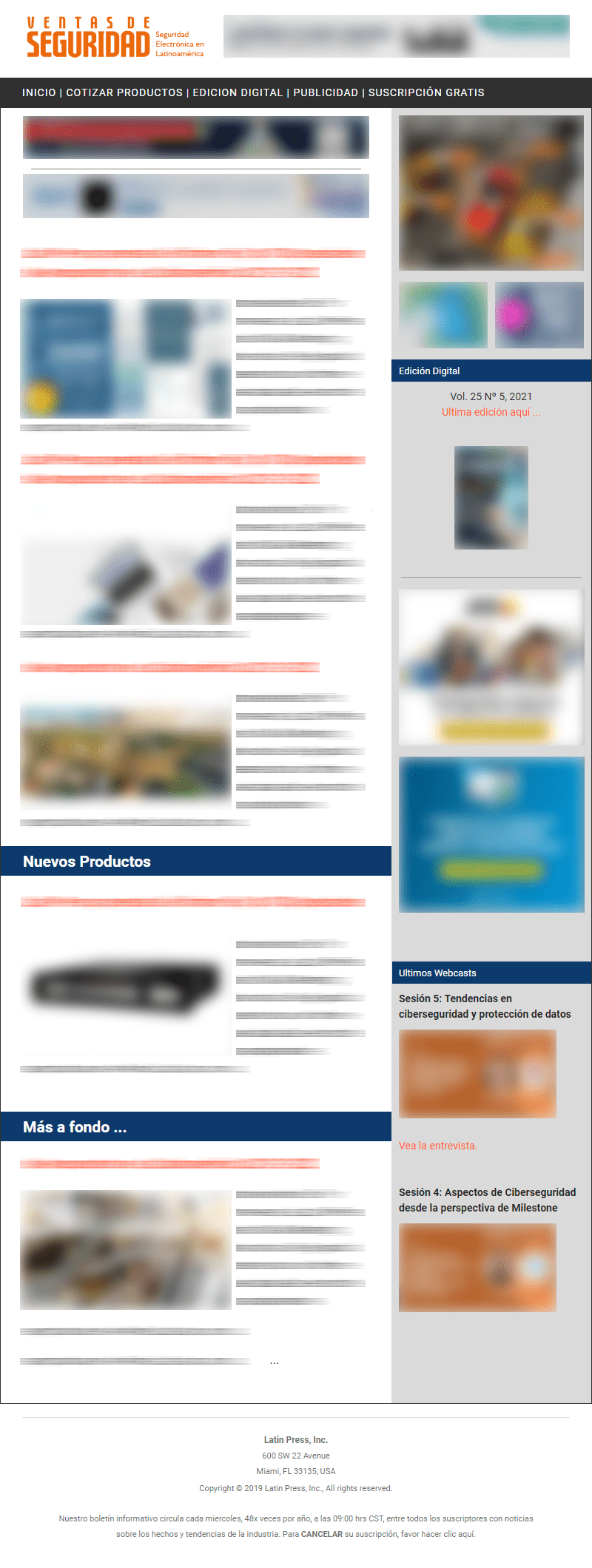 In ancient times pirates were those beings who sailed tirelessly at sea and robbed entire towns and countries, some of them were punished while others managed to escape.
In ancient times pirates were those beings who sailed tirelessly at sea and robbed entire towns and countries, some of them were punished while others managed to escape.by Ana María Restrepo
Today these pirates also sail, not in the vast blue oceans, but in a virtual reality through which they also commit great crimes.
The history we know of attacks and threats in information technology is not current. These date back to the 50s when young people eager to discover and learn about systems made jokes in their universities or in recognized companies, modifying telephone or electricity systems or manufacturing scale models, which for unknown reasons were located in unimaginable places; however, these young people had a code of ethics which stated that they could not harm or affect the physical infrastructure.
At that time and already in the 60s, these players, who possessed superior technical knowledge, began to be recognized as hackers or as a group of people who performed actions anonymously for fun or knowledge but without negative consequences, moreover, many of them left in writing the instructions that reversed their actions.
When computer technology begins to spread in the world and computational resources appear in universities, the term hacker begins to migrate towards this type of technology and these young mischievous people begin to make modifications to the Unix system, managing to transform it to what we know today. It should be noted that still in this era, a hacker was that person who knew the technology well and was able to use it to its full potential, even in applications that no one thought that technology could be used.
Hacker and cracker, what's the difference?
In these last forty years, technological development has awakened in many people a high curiosity that can be well or misused depending on the case.
According to Juan Guillermo Lalinde, coordinator of the master's degree in Computer Engineering at the Eafit University of Colombia, a hacker explores for his own resources in the machines to which he has access and could be said to work for a scientific concern, but when developing these activities the individual begins to enter other people's machines he crosses the thin line of privacy and, even without wishing it, he can do damage and affect infrastructures.
Within this topic a series of elements have emerged to differentiate hackers from crackers and perhaps the most remarkable is that when a person uses certain scientific knowledge to profit at the expense of others and harms them becomes a cracker, while the hacker continues to be that restless individual who knows technology at a level high.
Within the concept of computer security hackers and crackers have become confused and many people continue to call hackers those ill-intentioned; however, in Spain they solved this incongruity by calling good and bad hackers 'hackers'.
The actions of a hacker
The actions of a technology specialist could be compared to those naughty children who play ring-ring run-run (ring the doorbell of a house and run away), who skip social norms or behaviors a little without affecting anyone or anything.
However, beyond this phenomenon, at present the problem lies in the fact that the whole world depends in a very strong way on information technologies and any mistake that a hacker can make in this field can be very serious.
In recent months, hacker attacks have intensified around the world; in some Latin American countries, hackers have put government security on edge.
Since 1999, state entities in Paraguay have been hacked without those in charge of the computer area being able to do anything; as happened in mid-July when the website of the Comptroller General of this country was hacked by a group of young people who do not rule out continuing with this practice. Similarly in Argentina, a hacker left, at the beginning of this year, more than 1000 service stations without fuel supply by violating the security of the Website of the Ministry of Energy; and in Boston, United States, two hackers stole data from the Department of Transportation and various companies.
A hacker also managed to breach software that prevents songs acquired by a user for their Zune media player, manufactured by Microsoft, from being copied to other devices. Moreover, some of these hackers believe that their knowledge may be so good that they have gone on to act. as the newspaper El Mercurio of Chile calls it, as if they were the modern Robin Hood, stealing from rich and poor to give the money to charitable institutions, and not properly because they are charitable, but because they have found that by donating these monies they can verify the validity of the numbers of the cards they steal.
Robin Hoodes that harm the whole society
These actions, which ceased to be naïve and with which many young people sought to improve their technical development, have gone on to affect information technology by transforming it completely, discovering the programming errors of the systems and becoming a threat that can destroy society.
"Information technology represents an increasingly important tool in business, however implementing an information and security system in a company does not guarantee that it will obtain results immediately or in the long term," says Lalinde.
In recent days a gang of hackers managed to penetrate approximately 30 websites of the Philippine government with the "zero-day" system, which identifies the flaws, gaps or backdoors that computer programming experts discover in software systems to control or sabotage them. This mode of action used by this group of pirates is just one of many that can be used to affect information technologies.
The way hackers act are several, but as such their main modality is based on finding vulnerabilities to be able to exploit the system and get into it. In the words of Juan Guillermo Lalinde security is like a chain, which is as strong as the weakest link and that link is people; because many of the attacks that pirates manage to consolidate are done through a technique called social engineering, which consists of obtaining information from the good faith of people to break some information system such as emails and obtain information that is useful to carry out a specific task ífica.
Another weak point within computer security lies in the configuration problems and the lack of knowledge in the administration of a system by the person in charge, who having it misconfigured allows the access of a pirate to spread a worm or a virus.
On the other hand, programming errors also allow the exploration of hackers. Some studies have shown that a program can contain on average one error for every 1500 lines of code, but there are applications that can have four or five million lines of code, which implies that those applications could contain 2000 errors. However, the global trend is towards secure programming, which includes the entire life cycle of a system's information, how it is handled, to whom it is provided, how applications are designed and how they are coded. to how it is installed and its operation.
Migration of crimes
The very development of information technologies has caused a social migration, which has not only made people need more of them daily, but has supplanted the physical world to the point that crimes that are committed in the real world move to the virtual world to deceive people and continue to do damage without any inconvenience. Moreover, this migration of crimes has not been fully presented since computer attacks are not conceived as such within the laws of many countries.
In Colombia, for example, there is very little legislation on this issue specifically. Some laws such as 679 of 2001 contain the statute to prevent and counter child pornography and include any media used to confuse it. The Penal Code sets out different punishments for hackers ranging from fines to years in jail. The National Police also plans to implement the Colombian Computer Security Incident Response Center, which will provide the service of handling computer security incidents, through the analysis of events, response to online events, support for incident response and coordination of incident response.
Although Colombian legislation is not strong in this case of crimes, the Judicial Police of Colombia presented at the VII National Day of Computer Security some data that demonstrate its fight against cybercrime which has increased in recent years. In this Latin American country, 433 investigations were carried out in 2006 and to date 148 arrests have been carried out, 15 organizations have been dismantled, 212 web pages have been blocked, 395 computers have been seized, $2.9 billion recovered and 1,025 investigations are being carried out on web pages and another 1,036 on emails.
Although many believe that in Colombia information technologies do not have as high an advance as in other countries, the truth is that this country is on par with developed countries and handles the same level of global complexity in the network, because it has organized gangs that sell computer attack services to different organizations, people or groups outside the law.
The legality of hacking
In the aspect of what is legal or not, we return to the discussion about the difference between a hacker and a cracker, because if we think that the person in charge of the information security area of a company must become a hacker in order to investigate and know the techniques used by hackers to protect their system, we could call him a good hacker; However, if we continue to think that hackers are only those who threaten systems and commit attacks, then we find that this person differs from any hacker and cracker because he is simply authorized to go through every place in the system.
What does computer security involve?
Privacy or confidentiality, the difference between the public and the private and the respect of others, are the main characteristics that describe computer security.
For Juan Guillermo, most Colombian companies are not fully prepared to fight hackers, and although many of them have tools such as firewalls, intrusion detection and prevention systems, antivirus, in addition to machine access control and backup policies, the control of email, and the protection of remote access points with virtual private networks, only manage to make the security manager forget about the underlying problem and hackers can find the vulnerability of the system. Likewise, the engineer recognizes that there are also companies that periodically perform audit or validation of the configuration they have of the technology, which allows them to find the weak points and correct them. "However, the ideal would be for companies to join these defense tools to carry out a more active monitoring of the network and be able to guarantee that entry to it is difficult," he said.
What's next for Colombia
Every day the computer security market in Colombia is growing, although it is asleep because people or companies believe that they do not need security units. But, without being a bird of bad omen, companies in the country will wake up to the need for this type of security to the extent that attacks continue and reproduce faster and faster as has happened in other countries.
And again the phenomenon of the underestimation of development can put an entire country on tenterhooks, because according to Lalinde, who knows the computer events in Colombia and the world, hackers in the country are well prepared as well as those companies that offer audit and consulting services in computer security and who have a clear vision, however the Colombian industry in general is not well prepared, because it does not have an awareness of what information security implies.
In the same way, and as Juan Guillermo affirms, the future of Colombian computer security will change for two reasons: the first because all international negotiations that will be carried out will require compliance with certain norms and standards within this field of security; and the second because in the country the right to privacy and the notion of Habeas Data are gaining strength and the punishment of cybercrimes is being considered within the legislation.

























Leave your comment